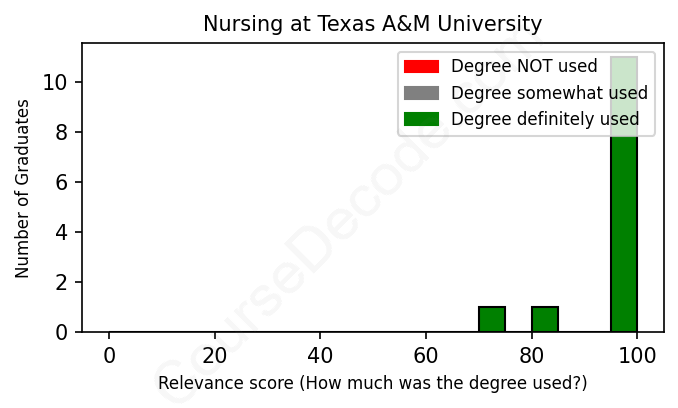
First, some facts. Of the Nursing graduates from Texas A&M University we've analyzed , here's how many have used (or NOT used) their degree in their career:

These are estimates based on AI analysis of 13 LinkedIn profiles (see below).
The verdict? Great! Overall, with an average relevance score of 96%, Nursing graduates from Texas A&M University have a substantially higher likelihood (+29%) of finding work in this field compared to the average graduate across all fields:
And for comparison, here's the chart for all profiles we've looked at across all degrees.
Also, after graduating, only 7% of these graduates have pursued further education other than another Bachelor's degree (such as a Masters degree or other), compared to the average across all profiles of 35%. This suggests a Bachelors degree is enough for most Nursing graduates, and it's normal to look for work straight after graduation.
See the details:
|
Relevance score: 100% We think this person has gone into a career highly relevant to their degree. We think this person has gone into a career highly relevant to their degree.
DEGREE INFOGraduated in 2023 from Texas A&M University with a Bachelor's degree in Nursing. No other secondary education since. JOB HISTORY SINCE GRADUATIONRegistered Nurse Ascension Jan 2023 - Present ABOUTNo information provided. |
The top 10 most common jobs done by the graduates we've analyzed (ranked most common to least) are:
Most people who graduated with a degree in Nursing from Texas A&M University seem to land jobs that are pretty much spot-on related to what they studied. You'll notice a lot of them work as Registered Nurses, Family Nurse Practitioners, or in specialized nursing roles, which rely heavily on the skills and knowledge they gained during their degree program. Many of these roles are directly involved in patient care, like being a Pediatric Registered Nurse or a Nurse Supervisor. So, it's clear that most graduates are diving right into nursing-related positions that take advantage of their training and prepare them to provide essential healthcare services.
However, there are a few outliers, particularly in roles like Health Services Manager or Clinical Liaison, where the focus shifts more towards management and coordination rather than hands-on nursing. While these jobs may still benefit from a Nursing background, they don't engage the specific clinical skills day-to-day like traditional nursing roles do. Overall, though, the majority of jobs held by these Texas A&M Nursing grads are highly relevant to the nursing profession, showcasing the solid foundation and opportunities that a Nursing degree can provide.
Here is a visual representation of the most common words in job titles for Nursing graduates (this is across all Nursing graduates we've analyzed, not just those who went to Texas A&M University):

So, looking at the career paths of Texas A&M Nursing graduates, it seems like they've been doing pretty well for themselves! Most of them kick off their careers as registered nurses (RNs), which is totally expected. For example, graduates from the classes of 2013 to 2023 are landing RN positions at hospitals or urgent care facilities right after they graduate. It appears that they typically stay in these nursing roles for a few years, gaining experience and honing their skills. From what I can see, many of them then transition to more specialized roles or advance in their careers, like becoming Family Nurse Practitioners or moving into management positions. This suggests that the program prepares its students well for the workforce.
Fast forward five to ten years, and it's clear that a lot of these graduates have moved up the ladder. Many have taken on leadership roles, such as health services managers or clinical nurse managers, showing that they’re not just sticking to basic nursing tasks but expanding their careers significantly. This kind of upward mobility indicates that they're finding meaningful and relevant work, not just jobs that are tangentially related to their degree. Overall, it looks like Texas A&M Nursing grads are doing well in their careers, with lots of positive trajectories in the nursing field!
Honestly, getting a Bachelor’s degree in Nursing, whether at Texas A&M or elsewhere, is no walk in the park. It’s definitely on the challenging side of things because you’re not just learning textbook stuff; you’ve got clinical hours, hands-on practice, and a lot of science classes that are pretty tough. There’s a lot of memorization and applying that knowledge in real-life situations, so it can feel overwhelming at times. That said, if you’re passionate about helping people and are willing to put in the effort, it can also be super rewarding. Just be prepared for some late nights and a good amount of studying!
Most commonly, in the LinkedIn profiles we've looked at, it takes people 1 years to finish a Bachelor degree in Nursing.
From what I'm seeing with these Texas A&M nursing grads, it seems like they've generally found solid career paths in the nursing field, which usually offers pretty decent pay. The more experienced ones, especially those who moved into roles like Family Nurse Practitioner or Health Services Manager, are likely pulling in some good salaries since advanced practice roles typically come with fatter paychecks. The newer grads, like those just starting as registered nurses, are probably on the lower end of the pay scale, but even entry-level nursing jobs can offer nice starting salaries and benefits. So overall, it looks like they’re doing pretty well financially compared to many other fields, especially as they grow in experience.
Here is a visual representation of the most common words seen in the "about" section of LinkedIn profiles who have a Bachelor degree in Nursing (this is across all Nursing graduates we've analyzed, not just those who went to Texas A&M University). This may or may not be useful:

Here are all colleges offering a Bachelor degree in Nursing (ordered by the average relevance score of their Nursing graduates, best to worst) where we have analyzed at least 10 of their graduates: